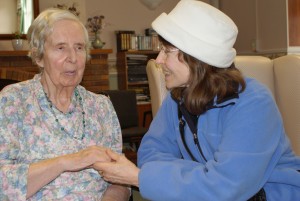A national newspaper has revealed that hospital security guards are being used to restrain disturbed dementia in NHS hospitals. Under the Freedom of Information Act it surveyed all 160 NHS Trusts, and found that only four said they banned security from restraining patients under any circumstances. Forty-two hospitals admitted using security staff to deal with patients and 17 admitted calling security to control those with dementia.’[i] There were 5,722 restraint incidents in two years across the 42 hospitals, 320 of which were recorded as being dementia patients. It could be more, as such incidents were often grouped under ‘mental health’.
Being in hospital can be disorientating and upsetting at the best of times, but for people with dementia who struggle to understand what is happening and have difficulty making themselves understood it can be terrifying. Janet Jacob, former psychogeriatric nurse and care home manager said, ‘It must really be horrendous for some of them, not knowing where they are, perhaps, and with strangers all around them. They must feel very unsafe. The key to caring for a person with dementia is to know as much as you can about them, and be able to understand what they are trying to tell you, and know what triggers their behaviour. Aggression is sometimes the only way a person can express their fear or frustration.’

The Chief Executive of Dementia UK said that violence could erupt when communication has broken down, and ward staff hadn’t been trained to understand the person’s needs and how they are being expressed. ‘Former care minister Paul Burstow said: ‘If the distress and confusion often associated with dementia is routinely managed through physical restraint rather than skilled care that is completely unacceptable.’
Five years ago there was an outcry against the use of major tranquilizers (antipsychotics) to calm dementia patients. They were called a ‘chemical cosh’ and research had shown that their use could lead to patients’ early death. But hospital psychiatrist Max Pemberton pointed out at the time that sometimes when people with dementia become paranoid or very distressed they can get great relief from small doses of antipsychotic. He added, ‘Doctors don’t prescribe antipsychotic medication because they want to; they do it because they have to. They are used because they sedate the patient and the alternative – specialist care – is too costly and therefore not readily available.’ [ii]
Even if not needing restraint, it’s known that people with dementia decline very swiftly on a hospital ward. Gloria, (name changed) a resident at Royd Court needed had to go in to hospital to investigate the causes of a physical change. Care Manager Georgina Lansdell visited her regularly. Georgina was dismayed that, after a couple of weeks, Gloria, who’d been very ‘tottery’, stopped walking altogether, and also stopped talking and eating. Investigations concluded, Georgina insisted that Gloria came back to her own home. The Consultant said she was about to commit Gloria to an EMI (elderly mentally infirm) ward, but Georgina insisted ‘we want her home.’. After a few weeks back in her own home and in her own bed, with loving care and the spiritual input she’d missed, Gloria began to speak and to eat again, though her ability to walk never recovered. Her special delight is to be taken in her special chair down to daily devotions in the big lounge, with the others.
It would be interesting to know what dementia patients would prefer. Would they rather receive a small dose of antipsychotic to calm them down or be restrained by a security guard? It’s not possible to ask them. But what we do know is that this kind of distressing behaviour is rare in our care homes, where staff receive specialist training, as much about the person is known as is possible, and people with dementia are given the loving care and personal attention that helps them. ENDS.
http://www.telegraph.co.uk/news/health/8093523/The-dangers-of-cutting-the-chemical-cosh.html














